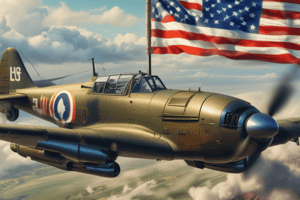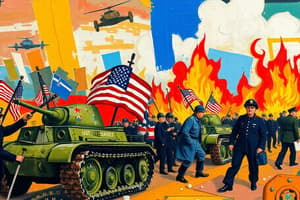Podcast
Questions and Answers
Who was known as the 'Man of Steel' and focused on agricultural and industrial growth in the Soviet Union?
Who was known as the 'Man of Steel' and focused on agricultural and industrial growth in the Soviet Union?
- Adolf Hitler
- Benito Mussolini
- Francisco Franco
- Joseph Stalin (correct)
What political system is characterized by absolute and centralized control by the government?
What political system is characterized by absolute and centralized control by the government?
Totalitarian
What was the main characteristic of fascism?
What was the main characteristic of fascism?
- Extreme nationalism and racism (correct)
- Isolation from world affairs
- Emphasis on communism
- Total ownership by the government
What was the Munich Pact?
What was the Munich Pact?
Adolf Hitler was from _____ and led the nation towards military expansion.
Adolf Hitler was from _____ and led the nation towards military expansion.
Isolationism refers to a national policy of avoiding involvement in world affairs.
Isolationism refers to a national policy of avoiding involvement in world affairs.
What event got the US militarily involved in WWII?
What event got the US militarily involved in WWII?
Match the following leaders to their respective countries:
Match the following leaders to their respective countries:
What were the Neutrality Acts?
What were the Neutrality Acts?
The practice of giving in to aggression to avoid war is called _____ .
The practice of giving in to aggression to avoid war is called _____ .
What was the 'Lend-Lease Act'?
What was the 'Lend-Lease Act'?
Study Notes
Key Figures and Concepts
- Joseph Stalin: Leader of the Soviet Union, known for promoting agricultural and industrial growth under communism, nicknamed "Man of Steel."
- Benito Mussolini: Italian dictator, anti-communist, and proponent of fascism, focused on military expansion.
- Adolf Hitler: German chancellor, known for promoting racism, anti-communism, and Nazism; sought military expansion and withdrew Germany from the League of Nations.
- Japanese Militarists: Adopted similar ideologies to Hitler; responsible for the invasion of Manchuria.
- Francisco Franco: Leader of Spain during the Spanish Civil War, became a fascist dictator after attacking the Spanish republic.
Political Systems
- Totalitarianism: A government system in which political authority holds absolute and centralized control.
- Fascism: An authoritarian political system emphasizing extreme nationalism, racism, and intolerance for opposition, ruled by a dictator.
- Communism: A political system in which the government owns all property and controls all aspects of life.
- Nazism: A variant of fascism with a focus on racial superiority, specifically targeting Jews and other minorities.
Historical Events and Policies
- Isolationism: A national strategy aimed at avoiding involvement in foreign conflicts.
- Neutrality Acts: Legislation that restricted the U.S. from supplying arms or support to warring nations; modified by FDR to aid China against Japan before war was declared.
- World War II: The global conflict from 1939 to 1945.
Pre-War Dynamics
- Neville Chamberlain: British Prime Minister known for his policy of appeasement towards Hitler.
- Winston Churchill: Chamberlain's rival, became Prime Minister in 1940, strong opponent of appeasement.
- Munich Pact: Agreement that allowed Hitler to acquire Sudetenland, criticized by Churchill for its policy of appeasement.
- Appeasement: The practice of conceding to aggressor states to prevent war.
Military Strategies and Conflicts
- Non-aggression Pact: Secret agreement between Hitler and Stalin to avoid conflict and divide Poland.
- Blitzkrieg: German military strategy emphasizing rapid attacks for quick victories.
- The Phony War: A period of inactivity where French and British troops faced the Germans without significant action.
Key Military Outcomes
- Fall of France: Italy joined Germany in the invasion, leading to the establishment of a Nazi-controlled puppet government in southern France.
- Battle of Britain: A pivotal air campaign fought between Britain and Germany; British victory disrupted Hitler's plans.
Holocaust and Human Tragedy
- Holocaust: Systematic extermination of Jews and other minority groups by the Nazis.
- Kristallnacht: Wave of anti-Jewish violence on November 9, 1938, marked by the destruction of property and increased persecution.
- Ghettos: Segregated sections where Jews were forcibly relocated.
- Concentration Camps: Detention centers where prisoners faced inhumane conditions, leading to mass deaths.
Economic and Military Policies
- Cash-and-Carry Policy: Allowed warring nations to purchase arms from the U.S. if paid in cash and transported on their own ships.
- Lend-Lease Act: U.S. policy to provide military aid to allies, especially Britain, due to financial limitations.
- Selective Training and Service Act: The first peacetime draft in American history.
U.S. Involvement in WWII
- Axis Powers: Coalition of Germany, Italy, and Japan during WWII.
- Pearl Harbor: Surprise attack by Japan on December 7, 1941, led the U.S. to officially enter WWII.
- Trade Embargo: U.S. response to Japanese aggression in Asia, cutting off oil and other resources.
Major Themes and Terms
- The Great Arsenal of Democracy: Aimed at turning the U.S. into a major production center for military resources to combat Axis powers.
- Allied Forces: Coalition including the U.S., Britain, and the Soviet Union, formed during WWII to oppose the Axis powers.
- Hideki Tojo: Prime Minister of Japan during WWII, known for militaristic policies leading to conflict with the U.S.
Studying That Suits You
Use AI to generate personalized quizzes and flashcards to suit your learning preferences.
Description
Test your knowledge on key figures from US History Chapter 16 with these flashcards. This quiz covers important leaders like Joseph Stalin, Benito Mussolini, and Adolf Hitler, along with their political ideologies and impacts. Perfect for students looking to review essential concepts and terms related to history.




